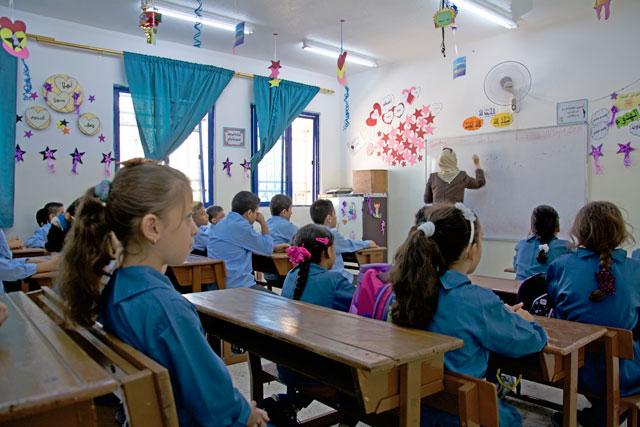You are here
Teachers at private schools speak out against ‘flagrant’ violations of their rights
By Laila Azzeh - Sep 30,2015 - Last updated at Sep 30,2015

Teachers at a private school in Irbid attend to the morning assembly ahead of a work stoppage they took part in on Sunday to protest low salaries (Photo courtesy of Heba Abu Ghnaim)
AMMAN – Violation of teachers’ rights at private schools continues to be “flagrant”, but thanks to a community-led campaign, educators are “more daring to speak out”.
For the past nine years, Heba Abu Ghnaim has been serving in a private school in Irbid Governorate, receiving “far less than the minimum wage”, which now stands at JD190 per month.
With incentives and raises offered “once in a blue moon” to the school’s 30 teachers, the bachelor’s degree holder said she believed that teachers could not take legal action against the injustices they faced.
“I did not know that our rights as teachers are stipulated in the law until I attended seminars conducted by the Stand With Teachers campaign,” she told The Jordan Times on Tuesday.
The campaign has been adopted by the National Committee for Equal Pay and is headed by the Labour Ministry and the Jordanian National Commission for Women, with the support of the International Labour Organisation (ILO).
According to experts from these institutions, the gender pay gap reaches around 41 per cent in the private education sector in Jordan.
The current target of the initiative is the northern Governorate of Irbid, as the number of private schools in Irbid is huge, ranking second to Amman, and the violations are “many”.
After attending lectures and other activities intended to raise awareness of educators’ rights, including the importance of collective contracts and getting paid at least the minimum wage, Abu Ghnaim convinced her colleagues — who are paid less than JD150 — to revolt against the school starting Sunday.
“Before taking any action against the school, I met with the management and principal to explain to them that they are violating the law by giving us low salaries. They promised me to do something about it, but months have passed and nothing has changed,” the grade-three teacher said.
The school’s 30 teachers observed a work stoppage on Sunday and refused to return to work until the school responds to their demands, which include allocating kindergarten places to their children as stipulated in the law.
“We also called on inspectors from the Labour Ministry to come and examine the school’s measures and check their legality. The school’s management has now been given two weeks to rectify the situation,” said Abu Ghnaim.
According to the ILO’s national pay equity consultant for Jordan, women constitute a “majority” of teachers in the private education sector, which has one of the highest gender pay gaps in Jordan, along with the health and light industries sectors.
Conducted with the help of teachers, the “Stand With Teachers” campaign seeks to raise teachers’ awareness on their rights, said Reem Aslan, the ILO’s consultant.
In earlier remarks to The Jordan Times, Eman Okour, head of the ministry’s economic empowerment division within the women’s labour department, noted that “teachers have no idea about their rights. Even those who are aware prefer to remain working in spite of their suffering because they know others will accept their jobs.”
Although the Kingdom ratified the ILO Equal Remuneration Convention in 1966, the organisation’s committee of experts entrusted with examining Jordan’s application of the convention maintained in 2013 that national laws and regulations contradict international standards.
The national regulations lack provisions that prohibit gender discrimination at work or stipulate the right of equal pay for equal-value jobs, the committee said.
Private School Owners Association President Munther Sourani said the syndicate fully supports the campaign, stressing that no school should be established without taking the rights of teachers into consideration.
“However, it is a vicious cycle. The economic situation of parents does not allow schools to increase fees to the level that enables them to pay good salaries to teachers. The sector requires massive restructuring, but schools should at least pay teachers the minimum wage according to the law,” Sourani told The Jordan Times earlier.
The Jordan Teachers Association (JTA) also works to create a better environment for private schoolteachers, officials said.
The head of the syndicate’s private education committee, Abeer Akhras, highlights that teachers have become “more courageous” after the establishment of the association and are now speaking out to find solutions after decades of injustices.
Social Security Corporation (SSC) Spokesperson Musa Sbeihi said thousands of teachers face these issues, estimating that around 11,000 private-school educators signed their resignation papers last summer and were later rehired. This is considered one of the employers’ tricks to avoid paying teachers for summer holidays.
“Many of the violations are also related to the salaries, such as teachers getting less money than what they have signed to receive. Teachers remain in their jobs because they fear that it is their only option,” noted Sbeihi, who said that there are more than 40,000 private-school teachers in Jordan.
“The sector has grown massively, but the regulations have remained the same. The rights of a very large segment of teachers are being violated,” he warned.
Drawing on her BA degree in history, Abu Ghnaim said that “a weak teacher cannot build a strong generation,” a motto she has been circulating among her peers to encourage them to stand up for their rights.
Related Articles
AMMAN — Educators at private schools face “flagrant” violations of their rights, but the fear of unemployment drives them to continue workin
AMMAN — After enduring years of “flagrant” violations, private school educators will now enjoy better job security thanks to a new decision
If it were not for a newly launched community-led campaign, female teachers at private schools would have had to wait for divine intervention to address the injustices they face, according to educators.













